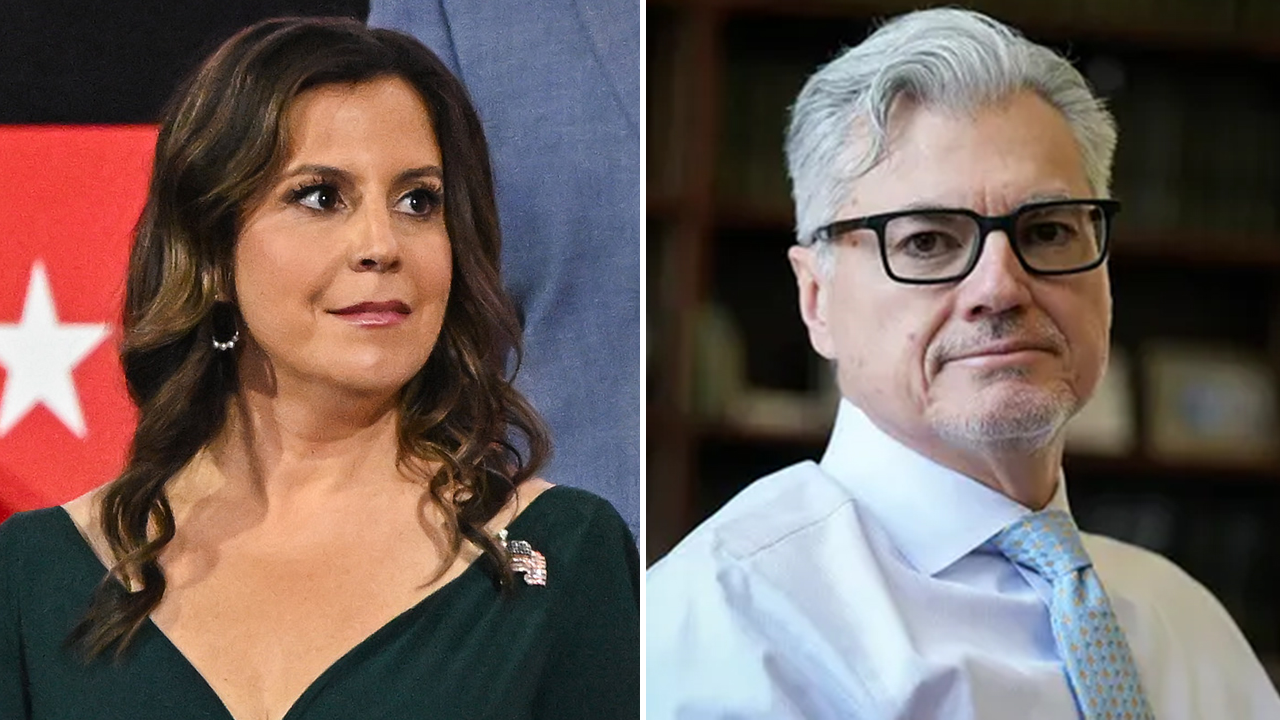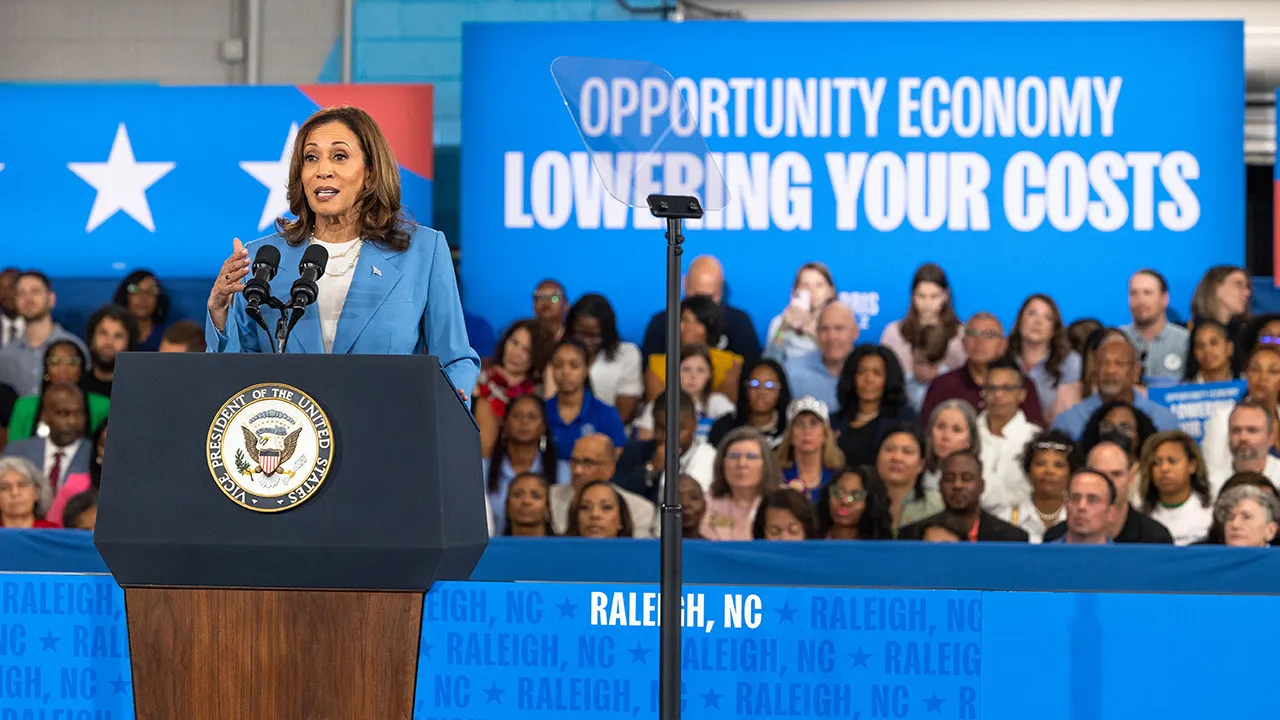Mississippi
A Mississippi teen unpacks how the Jackson water crisis impacts education

Georgianna McKenny, 17, is the high school grand-prize winner in NPR’s fifth-annual Student Podcast Challenge.
Imani Khayyam for NPR
hide caption
toggle caption
Imani Khayyam for NPR

Georgianna McKenny, 17, is the high school grand-prize winner in NPR’s fifth-annual Student Podcast Challenge.
Imani Khayyam for NPR
Georgianna McKenny’s award-winning podcast begins, fittingly, with a blaring alarm.
It’s an alarm clock, waking her 17-year-old cousin, Mariah, as she navigates a morning, back in January, when living in Jackson, Miss., meant waking up without access to clean water.
No showers, no drinkable water out of the tap, and, for a few days, no school.
McKenny is the newly-announced high-school winner of NPR’s fifth-annual Student Podcast Challenge. In a year with more than 3,300 entries – from middle- and high-schoolers in 48 states as well as Washington, D.C., and Puerto Rico – McKenny and her winning entry tell the story of the toll Jackson’s water crisis has taken on the city’s students.
“I don’t listen to podcasts”
Georgianna McKenny attends school two and a half hours northeast of Jackson, in Columbus – at the Mississippi School for Mathematics and Science, a prestigious, public boarding school for academically talented high-schoolers from all over the state.
In the school’s sun-filled lobby, summer-school students lower a handmade rope over a balcony. Others watch or conduct experiments of their own around the staircase. Mounted on one classroom door are posters in Russian, one of at least five languages students here can learn.
The school is something of a wonder, as is Georgianna.
A rising senior, she is soft-spoken, with glasses and hair in braids that hang to the corners of her broad smile. We meet her in the lobby, amidst the chaos, along with her English teacher, Thomas Easterling, who assigned the podcast as part of his composition class.

Georgianna poses with her English teacher, Thomas Easterling, who assigned the podcast contest as part of his composition class.
Imani Khayyam for NPR
hide caption
toggle caption
Imani Khayyam for NPR

Georgianna poses with her English teacher, Thomas Easterling, who assigned the podcast contest as part of his composition class.
Imani Khayyam for NPR
“The idea was, they need to know their hometowns better,” Easterling says of the assignment in his University Composition class. “Since I have students from all over Mississippi, they did research on the parts of their hometown that gave them a sense of place.”
Georgianna grew up south of Jackson and struggled, at first, to settle on a subject. Then she mentioned the water crisis, which has troubled Jackson for years, while texting with a friend from out of state.
“She lives in Georgia,” Georgianna remembers. “I texted her, and she was like, ‘What is that?’ Like, she didn’t know about it. I was like, really shocked.”
We walk to Easterling’s classroom, where Georgianna heads to her usual desk, in the back corner, and begins explaining how she went about making her podcast.
“I kind of had a vision in my head. I spend a lot of time in my head, actually, so it wasn’t that hard,” she says, smiling.
That’s Georgianna – disarmingly honest. While most of Easterling’s students worked in pairs – one writing, one producing – Georgianna did both, alone. Though she admits: She didn’t actually know how to make a podcast.
“I don’t listen to podcasts,” she says, “they’re, like, really boring.”
But once she settled on the Jackson water crisis, and specifically, on her cousin Mariah’s experience of it, Georgianna had something just as powerful as experience.
She had purpose.
“No water comes from the faucet”
NPR judges loved Georgianna’s entry because she took on a major story in her community, conducted in-depth interviews – and made excellent use of sound.
After being awakened by that blaring alarm clock, “Mariah starts her day by going to the bathroom, to check if her water pressure is working before getting ready for school,” Georgianna narrates at the beginning of her podcast. “No water comes from the faucet.”
When Mariah looks for a bottle of water, she finds none. Welcome to Jackson in January, 2023.
Georgianna’s podcast is about a few tough days in January, when low water pressure across the city hit families and schools hard.

Georgianna McKenny wins the high school award in NPR’s fifth-annual Student Podcast Challenge.
Imani Khayyam for NPR
hide caption
toggle caption
Imani Khayyam for NPR
For two days early in the month, all Jackson Public Schools went virtual because little to no water pressure in schools made it difficult to prepare meals and flush toilets, Georgianna reports. Even after students returned for in-person learning, low water pressure remained a challenge.
“Something so simple as using the bathroom has become difficult,” Georgianna narrates, under the sound of a flushing toilet.
“They ended up shutting down some of the bathrooms” because the toilets could no longer be flushed, says Mariah, Georgianna’s cousin, who remembers one particularly uncomfortable day.
“Class was not my main focus,” Mariah says. “I couldn’t do anything else besides hold it.”
Georgianna also interviewed an administrator with Jackson Public Schools, who agreed to discuss the crisis as long as Georgianna promised not to use her name.
Because water pressure continued to vary from school to school, instead of returning to virtual learning, the district sometimes sent students from one school to another.
“There were times when some other high schools relocated a grade level to our campus, which also made for extra adjustment to the classrooms,” the administrator says in the podcast. “Teachers weren’t able to be in the classrooms they’re usually assigned to. Students weren’t reporting to the area where they were assigned. So it just made for a very unpredictable circumstance.”
Mariah tells NPR, in a follow-up interview in downtown Jackson, that her school was one of those that ended up hosting a lot more students. “Sometimes the classroom would be packed. And just imagine the lunchroom, because our lunchroom is really not that big.”
The school administrator told Georgianna, the water problems even affected what students were given to eat. If there was enough water pressure, the cafeteria could prepare full, hot meals. If not: sack lunches.
Mariah, Georgianna’s cousin, was not a fan. “Imagine getting turkey and ham-and-cheese sandwiches for seven days straight. It felt like we were in prison.”
The good news is, this was back in January. Jackson Public Schools tells NPR, with the exception of a few boil-water notices and one high school having to return to virtual learning again in February, the district’s schools operated largely as usual for the rest of the school year.
As for Georgianna, she admits one of the hardest things about creating her podcast wasn’t the reporting itself; it was listening to the sound of her own voice.
The day Easterling played her assignment for the class, Georgianna remembers, “I requested, ‘Can I please leave the classroom when you play it?’ Because I couldn’t stand it.”
Easterling agreed, as long as she agreed to come back for her classmates’ critique.
Now, in winning NPR’s Student Podcast Challenge, Georgianna McKenny is getting exactly what she wanted: A platform to sound the alarm on behalf of the kids of Jackson.
To listen to Georgianna’s podcast, click here.
Visual design and development by: LA Johnson
Audio story produced by: Lauren Migaki & Janet Woojeong Lee
Audio and digital story edited by: Steve Drummond

Mississippi
As Climate Threats to Agriculture Mount, Could the Mississippi River Delta Be the Next California? – Inside Climate News

This story was originally published by The Tennessee Lookout.
A smorgasbord of bright red tomatoes and vibrant vegetables line the walls of Michael Katrutsa’s produce shop in rural Camden, Tennessee. What began a decade ago as a roadside farm stand is now an air-conditioned outbuilding packed with crates of watermelon, cantaloupe and his locally renowned sweet corn — all picked fresh by a handful of local employees each morning.
The roughly 20-acre farm west of the Tennessee River sells about half of its produce through his shop, with the rest going to the wholesale market.
Farms like Katrutsa’s make up just a sliver of roughly 10.7 million acres of Tennessee farmland largely dominated by hay, soybeans, corn and cotton. Specialized machines help farmers harvest vast quantities of these commodity “row crops,” but Katrutsa said the startup cost was too steep for him. While specialty crops like produce are more labor-intensive, requiring near-constant attention from early July up until the first frost in October, Katrutsa said he takes pride in feeding his neighbors.
The World Wildlife Fund sees farms in the mid-Mississippi delta as ripe with opportunity to become a new mecca for commercial-scale American produce. California currently grows nearly three-quarters of the nation’s fruits and nuts and more than a third of its vegetables.
Explore the latest news about what’s at stake for the climate during this election season.
But as climate change compounds the threats of water scarcity, extreme weather and wildfires on California’s resources, WWF’s Markets Institute is exploring what it would take for farmers in West Tennessee, Mississippi and Arkansas to embrace — and equitably profit from — specialty crop production like strawberries, lettuce or walnuts.
Specialty crops make up only 0.19% of the region’s farm acreage, but their higher sale value allows them to generate 1.08% of the region’s agriculture revenue, according to WWF’s May report, called The Next California, spearheaded by Markets Institute Senior Director Julia Kurnik. She argues that there’s an opportunity to proactively create more inclusive, higher-yield business models on existing farms, preventing natural ecosystems from being unnecessarily transformed into farmland.
But shifting produce growth to the Mid-Delta comes with hurdles: it requires buyers willing to try new markets, understanding of new crops’ diseases and needs, specialized equipment like cold storage and lots of expensive hands-on labor.
“It is not as simple as a farmer simply putting new crops in the ground,” Kurnik said.
Early Adopters Put Idea to the Test
Sixth-generation Arkansas farmer Hallie Shoffner is putting WWF’s models to the test through a nonprofit called the Delta Harvest Food Hub. The hub works with Black and women farmers to pilot the scalability of growing specialty crops in the Delta region, starting with specialty rice.
Shoffner grows basmati, jasmine, sushi rice, sake rice seeds and more on her 2,000-acre, century-old farm located in an unincorporated town outside Newport, Arkansas. She’s skeptical about a full switch to produce, but sees specialty rice products as “low-hanging fruit” easily adopted in the mid-Delta, where commodity rice is already widely grown.
The United States is the fifth-largest rice exporter in the world, and Arkansas is the country’s top producer, with other Mississippi River valley states not far behind. But the majority of specialty rice is grown in California or imported from East Asian countries.




“We are forward-thinking farmers who want to change, who want to do something different,” Shoffner said. “We want to make more money, because we know we cannot make as much money as small farms in the current agricultural economy.”
The commodity farming that dominates Delta agriculture makes the economic success of farmers largely dependent on the market prices of rice, corn, soybeans, wheat and other crops, Shoffner said. This incentivizes farms to grow larger to ensure they turn a profit even when prices are low, like they are now. But smaller farms struggle to stay afloat.
Shoffner said her vision for developing specialty crop markets in Arkansas will be through more collaboration between many smaller farms to diversify crop production and produce for large contracts together. She’s also exploring possibilities for expanding chickpea, sunflower, sesame and pea production in Arkansas.
And while she’s at it, Shoffner is working to make agriculture more equitable.
“As a white farmer who is a sixth generation farmer, I realize that I have inherited a large amount of land that systematically disenfranchised Black farmers,” Shoffner said. “And it is my responsibility to acknowledge that, and leverage what I’ve been given to help others.”
Her project, Delta Harvest, has a contract to grow specialty rice with a large company and she’s working with several Black farmers. She was too small to do it by herself, so they are doing it cooperatively.
Finding the Right Markets
In Mississippi, efforts to shift some of California’s sprawling specialty crop industry to the Mid-Delta drew skepticism from some farmers—even those with established specialty crop operations.
For the past 20 years, Don van de Werken has co-owned a 120-acre blueberry and tea farm in Poplarville, Mississippi, distributing much of its crops to buyers in his county and nearby cities.
Van de Werken questioned whether there would be enough regional demand to sustain a scaled-up specialty crop industry in Mississippi, noting that the success of his own enterprise hinges on targeting hyper-local markets like New Orleans. Shipping vegetables, fruits and other produce to buyers outside the Delta region would quickly become cost prohibitive for local farmers, van de Werken said.
“The problem we have, not just in Mississippi but the mid South in general, is we just don’t have the population base,” said van de Werken, who is also president of the Gulf South Blueberry Growers Association. “We don’t want our blueberries to go to Maine or Seattle. We want to focus our produce in a regional market.”


To make growing specialty crops worthwhile, Mississippi farmers would need to identify nearby buyers willing to purchase the new products on a consistent basis, van de Werken said. While selling goods directly to retail grocery chains like Kroger is often difficult, farmers could reduce financial risks by signing purchasing agreements with regional brokers like Louisiana-based Capitol City Produce.
“Anybody that puts anything in the ground is already taking a risk, but you want to minimize that risk,” he explained. “If you can prove to the brokers and the buyers that they can make money doing this, then the farming will come.”
The WWF report investigates ways to distribute risk across the supply chain to make selling to new markets easier on farmers, and works to connect buyers with Mid-Delta farmers.
AgLaunch, a Memphis-based nonprofit that guides farmers in innovation, estimates that adding specialty crops to the Mid-Delta region could spur $4.6 billion in added revenue and 33,000 jobs. But while commodity crop prices are readily available on the Chicago Board of Trade, the specialty crop market is generally not so transparent. Large, vertically integrated companies usually dictate contract terms, AgLaunch President and farmer Pete Nelson said.
AgLaunch helps build “smart contracts” that allow multiple farmers to produce on a contract, helping them secure higher quantity deals with proper compensation as a collective.
This story is funded by readers like you.
Our nonprofit newsroom provides award-winning climate coverage free of charge and advertising. We rely on donations from readers like you to keep going. Please donate now to support our work.
Donate Now
Purdue College of Agriculture professor Fred Whitford said the idea of farming cooperatives that help smaller farmers carve out space in a large-quantity market is more than 100 years old. Whitford compared commodity producers to retail giants like Walmart, which make money by selling in bulk. Small producers are more like Ace Hardware, he said.
“Maybe the smaller folks have an ability to make more off their land by going to a specialty crop,” he said.
New Challenges Need New Solutions
Farmers who embrace specialty crops will face hurdles before they make it to the market.
Growing produce can be more profitable but “easier said than done,” Whitford said. “It’s nice on paper … but boy, in reality, you’re going to have to keep an eye on this crop, whatever you’re growing, because one slip up … then you have lost a lot of money.”
In Tennessee, Katrutsa grew strawberries in addition to his other crops for 10 years, but last April, a hail storm pulverized his entire field, leaving him with nothing. He’s not growing strawberries this year, and he might not plant them again — he’s not sure if he can find enough labor to make it work.
He grows many types of produce so if one fails, it’s less catastrophic. He sources seedlings from a neighboring state (it’s cheaper than growing from seed) and plants five times each season to maximize yield.
He works with a consultant to help identify diseases and how to treat them. Tomatoes are the most challenging, Katrutsa said. Some of his tomato plants withered this year due to bacterial wilt that flourishes in wet soil and high temperatures and has few effective chemical remedies.
Carolyn Preble helps out farmer Michael Katrutsa at the farm shop, which stocks the more than 20 acres of produce Katrutsa grows in rural Camden, Tennessee. Credit: John Partipilo/Tennessee Lookout
Chemical treatments pose other challenges. In Shaw, Mississippi, Michael Muzzi relies on a range of herbicides to grow soybeans and other feed grains on his 2,000-acre farm. Once sprayed, herbicides like Liberty and Dicamba remain in the ground and can drift in the air, which is hazardous to specialty crops, like tomatoes, that aren’t resistant.
“You’re not going to be able to spray [those herbicides] on specialty crops,” Muzzi said. “You’d have to have something that’s chemically tolerant.”
Growing fruits and vegetables on a farm with previous heavy herbicide use would require insulating those crops from chemical runoff — a feat that could only be reliably achieved by leaving whole acres of land unused for years, he said.
AgLaunch is exploring innovative ways to address these problems. For some farmers, this means helping make their existing row crops more efficient using farmer-incubated technology, adding local value by growing specialty crops or taking on processing, Nelson said.
Then there’s disruption with higher risk: farmers can partner with agriculture automation technology startups, allowing them to field test their products and collect data in exchange for farmer equity in the startup companies. If the startup succeeds, the farmer shares in the benefits.
“It’s not as simple as, ‘Hey, we should grow tomatoes,’” Nelson said. “It’s how you think about the whole value chain and make sure the farmer is protected. Make sure it’s not an opportunity just to grow a crop, but it’s an opportunity to own part of the processing or to build new products.”
Kurnik said WWF isn’t trying to recruit farmers to start growing specialty crops – they just want Mid-Delta farmers to have the information they need to make informed decisions. In terms of acreage, row crops “dwarf” specialty crops in the United States. A small percentage shift would mean a significant change in the level of specialty crops in the Delta.
“We don’t need everyone to want to jump on board tomorrow,” she said. “They would flood the market if they did.”
This story is a product of the Mississippi River Basin Ag & Water Desk, an independent reporting network based at the University of Missouri in partnership with Report for America, with major funding from the Walton Family Foundation. Disclosure: The Next California report was also funded by Walton.
About This Story
Perhaps you noticed: This story, like all the news we publish, is free to read. That’s because Inside Climate News is a 501c3 nonprofit organization. We do not charge a subscription fee, lock our news behind a paywall, or clutter our website with ads. We make our news on climate and the environment freely available to you and anyone who wants it.
That’s not all. We also share our news for free with scores of other media organizations around the country. Many of them can’t afford to do environmental journalism of their own. We’ve built bureaus from coast to coast to report local stories, collaborate with local newsrooms and co-publish articles so that this vital work is shared as widely as possible.
Two of us launched ICN in 2007. Six years later we earned a Pulitzer Prize for National Reporting, and now we run the oldest and largest dedicated climate newsroom in the nation. We tell the story in all its complexity. We hold polluters accountable. We expose environmental injustice. We debunk misinformation. We scrutinize solutions and inspire action.
Donations from readers like you fund every aspect of what we do. If you don’t already, will you support our ongoing work, our reporting on the biggest crisis facing our planet, and help us reach even more readers in more places?
Please take a moment to make a tax-deductible donation. Every one of them makes a difference.
Thank you,
Mississippi
Mississippi man dies of an apparent overdose in MDOC custody in Rankin County

A 41-year-old man incarcerated at Central Mississippi Correctional Facility in Rankin County died Thursday of an apparent overdose.
Mississippi Department of Corrections Commissioner Burl Cain confirmed the death in a news release.
The man was identified as Juan Gonzalez. According to prison records, he was serving a four-year sentence on multiple convictions in Hinds County and was tentatively scheduled for release in May 2025.
“Because of the unknown nature of the substance, the Mississippi Emergency Management Agency and the Mississippi Department of Health were notified,” MDOC reported.
The investigation into Gonzalez’s death remains ongoing.
This is a developing story and may be updated.
Mississippi
Mississippi high school football scores for 2024 MHSAA Week 2

Watch as Clinton begins season with 26-20 win over Warren Central in Vicksburg
Watch highlights from Clinton’s 26-20 win over Warren Central in the Arrows season opener Friday night.
Here is our Mississippi high school football scoreboard, including the second week of the season for MHSAA programs.
THURSDAY
Heidelberg 14, Quitman 8
Independence 20, Byhalia 6
Myrtle 47, Potts Camp 18
North Pontotoc 41, Water Valley 19
Okolona 40, Calhoun City 0
Provine 16, Lanier 6
-

 World1 week ago
World1 week agoEconomic portfolios are key in talks to chose new EU commissioners
-

 Movie Reviews1 week ago
Movie Reviews1 week agoSaripodhaa Sanivaaram Movie Review Rating
-

 News1 week ago
News1 week agoHarris kicks off Georgia tour as Trump posts grievances on social media
-

 Politics7 days ago
Politics7 days agoTrump impersonates Elon Musk talking about rockets: ‘I’m doing a new stainless steel hub’
-

 World1 week ago
World1 week agoBrussels, my love? Is France becoming the sick man of Europe?
-

 Politics1 week ago
Politics1 week agoEx-California resident slams state bill that gives illegal immigrants housing loans: 'Asinine'
-

 Politics1 week ago
Politics1 week agoTrump campaign slams Harris as 'still a San Francisco radical' after CNN interview
-

 Politics1 week ago
Politics1 week agoHarris says no regrets about defending Biden fitness for office


/cdn.vox-cdn.com/uploads/chorus_asset/file/25607589/SHARE_20240906_0719580.jpeg)












